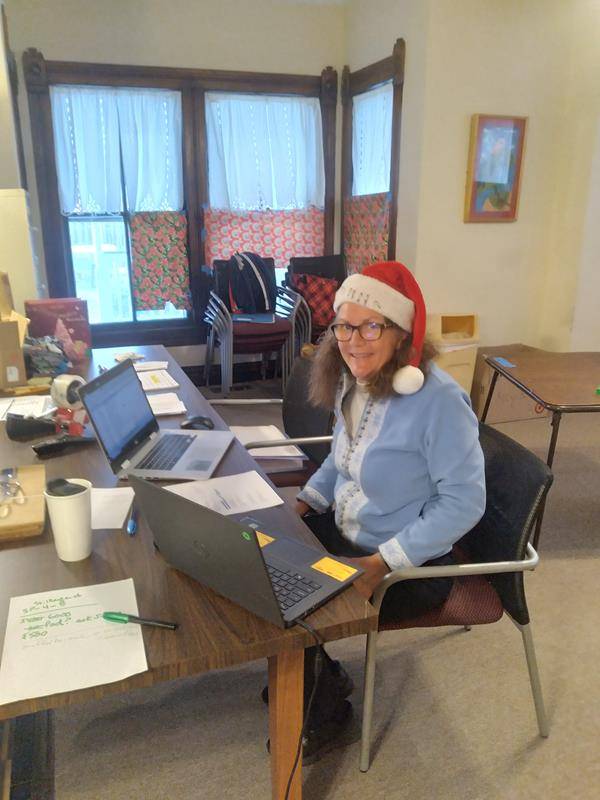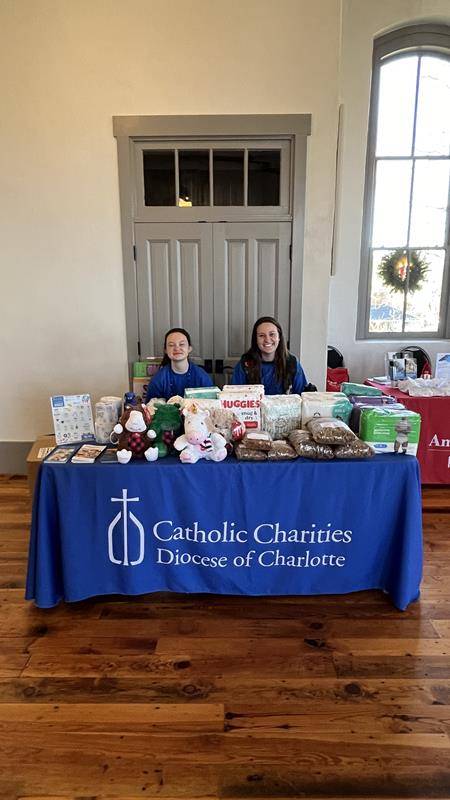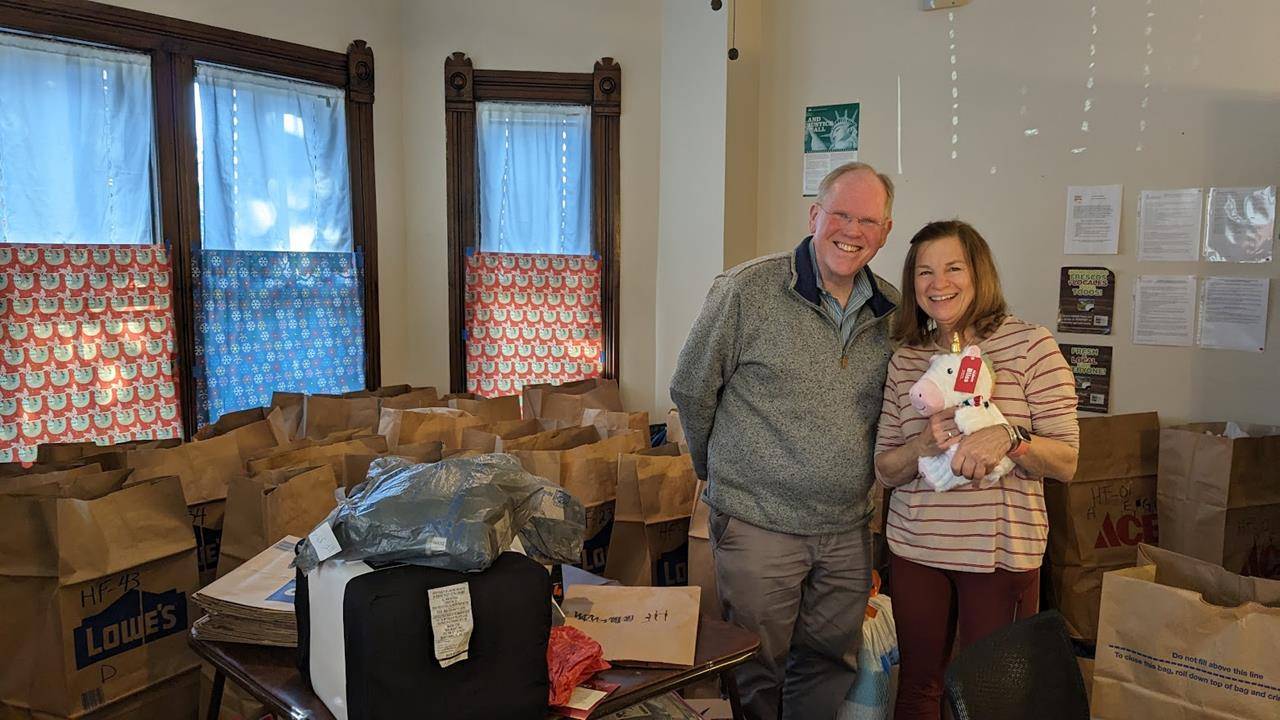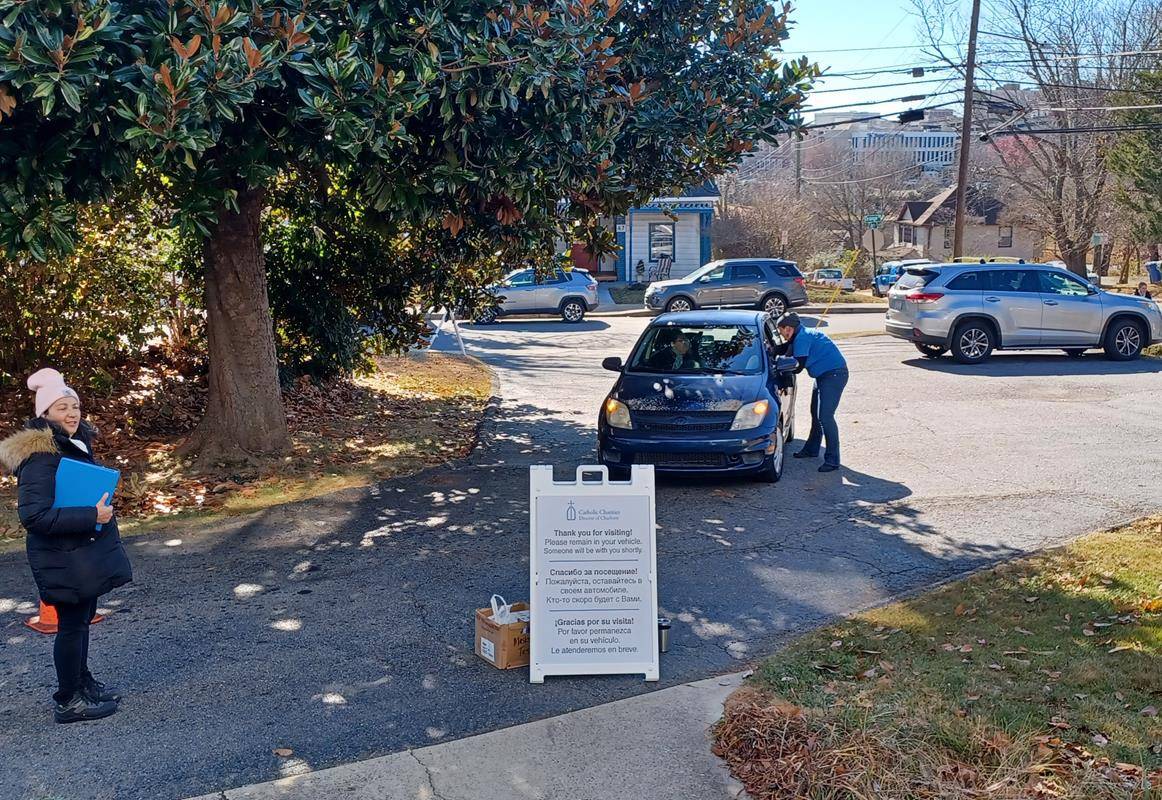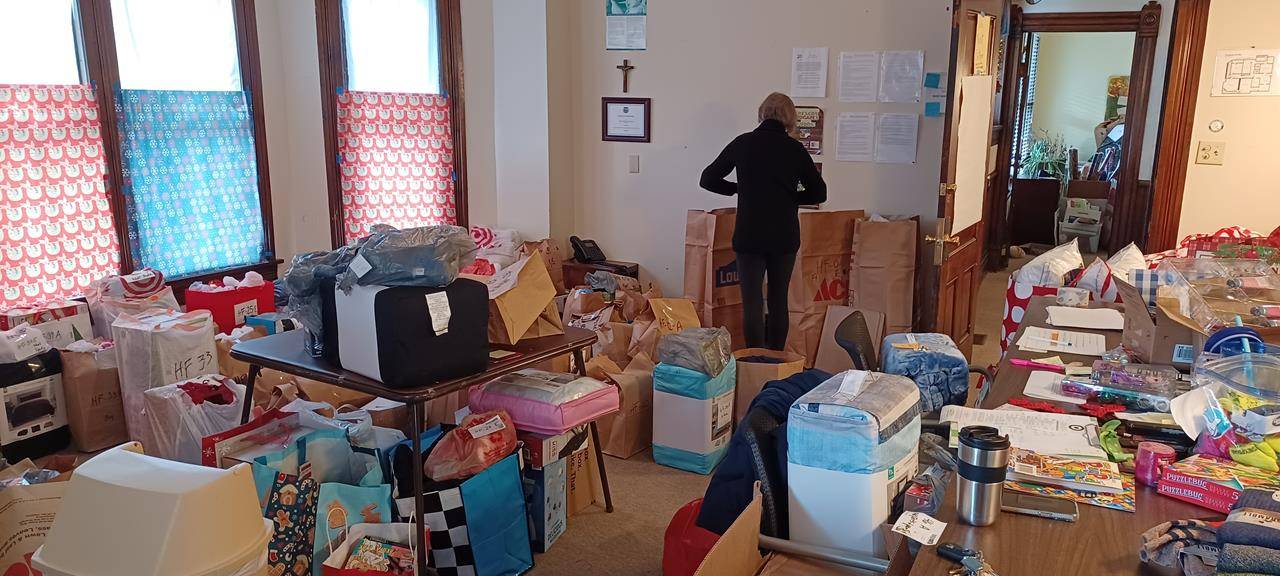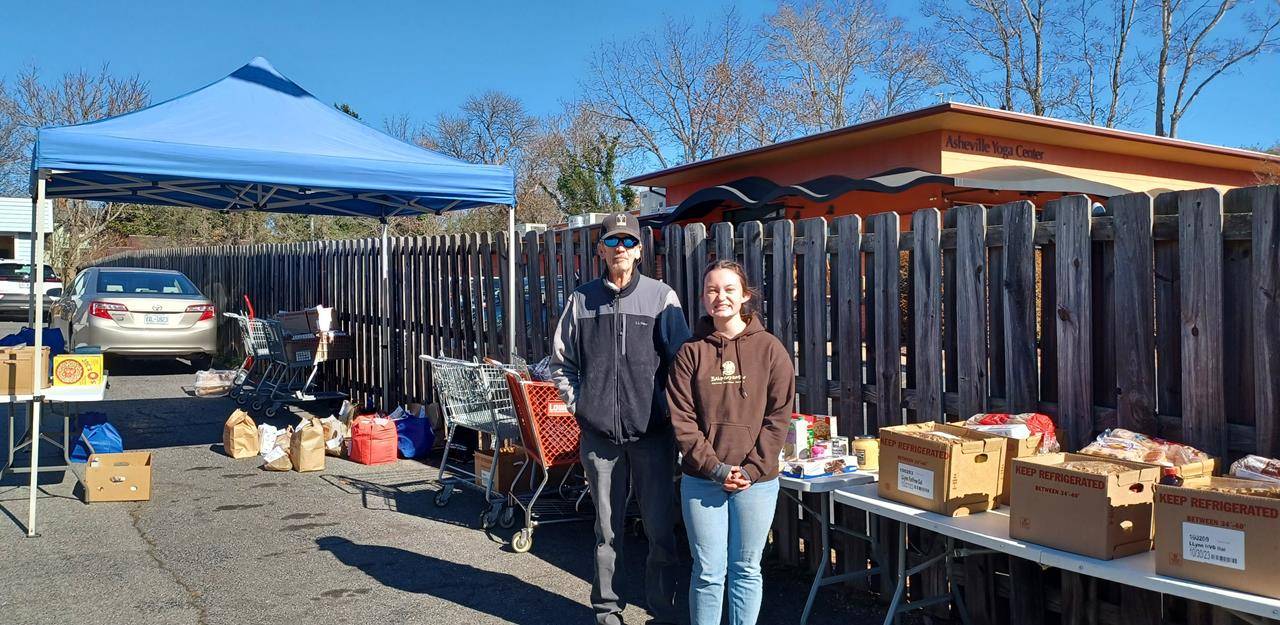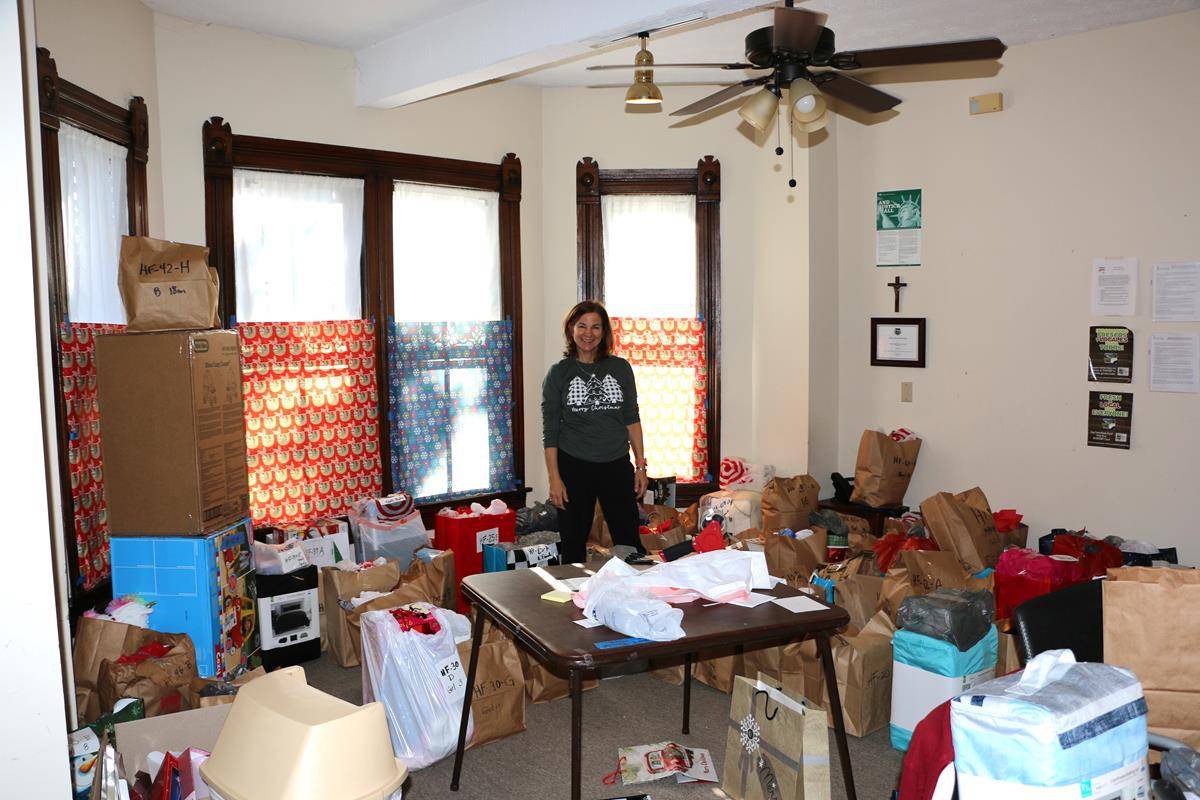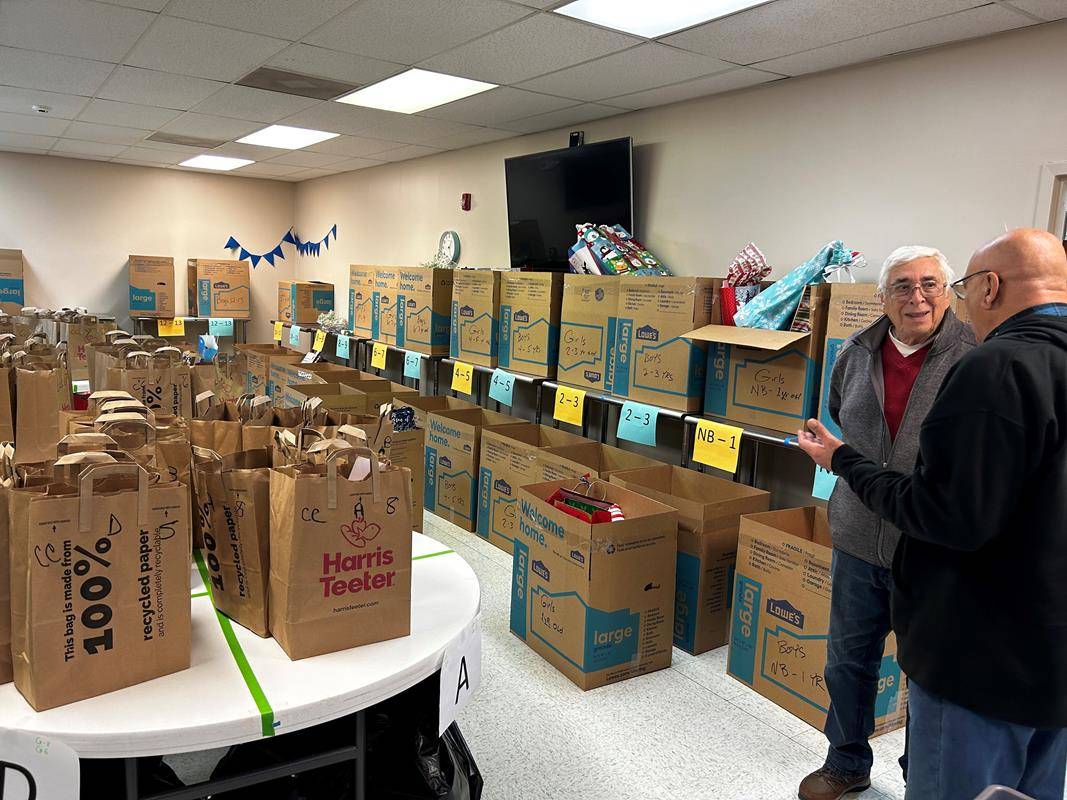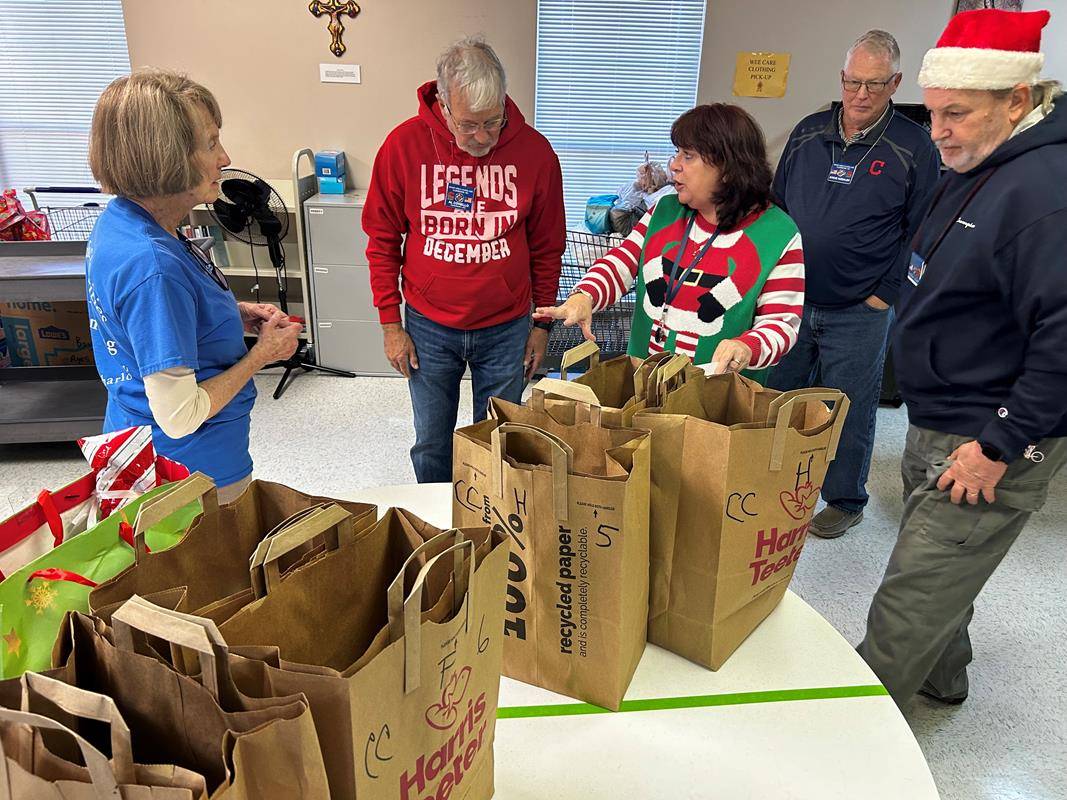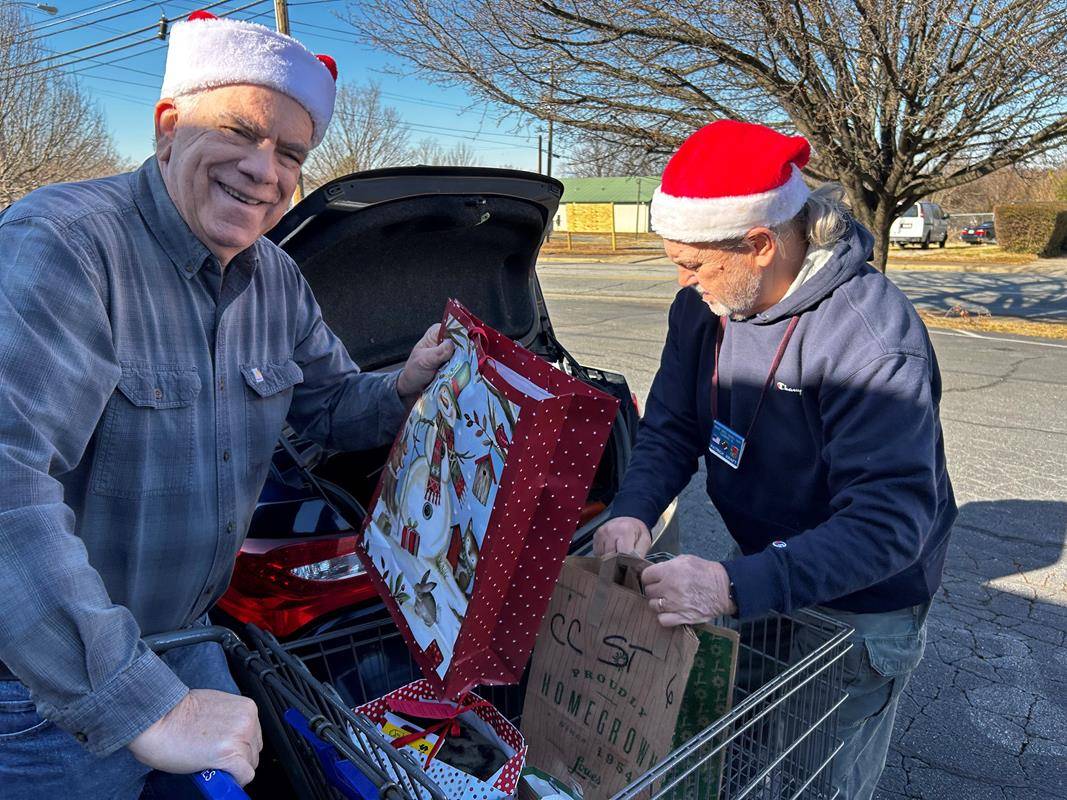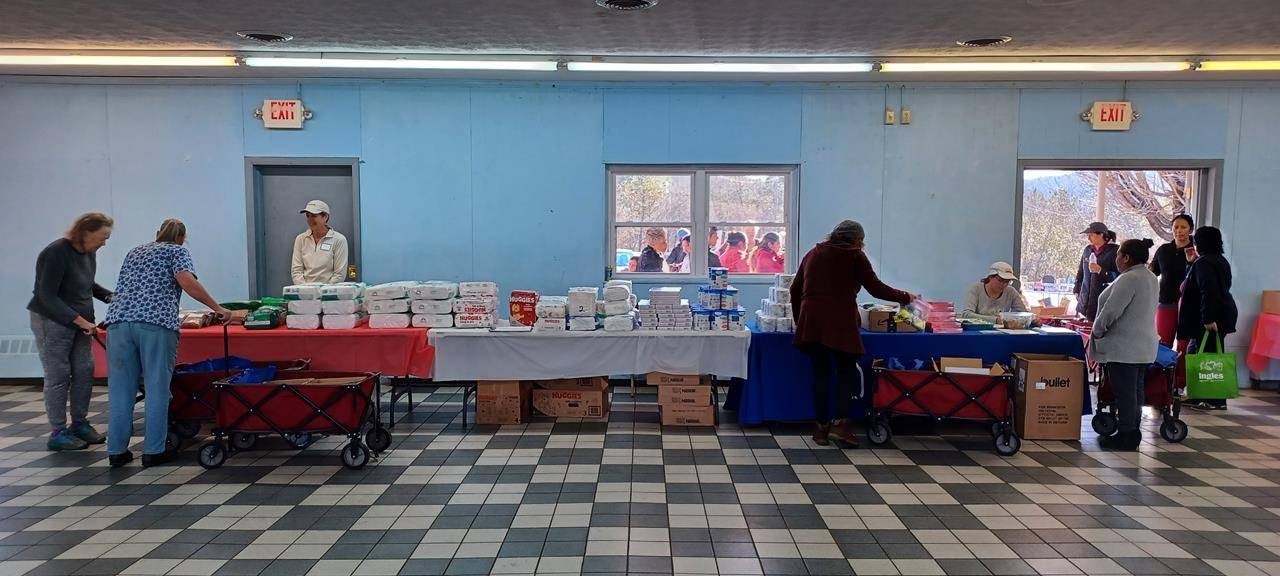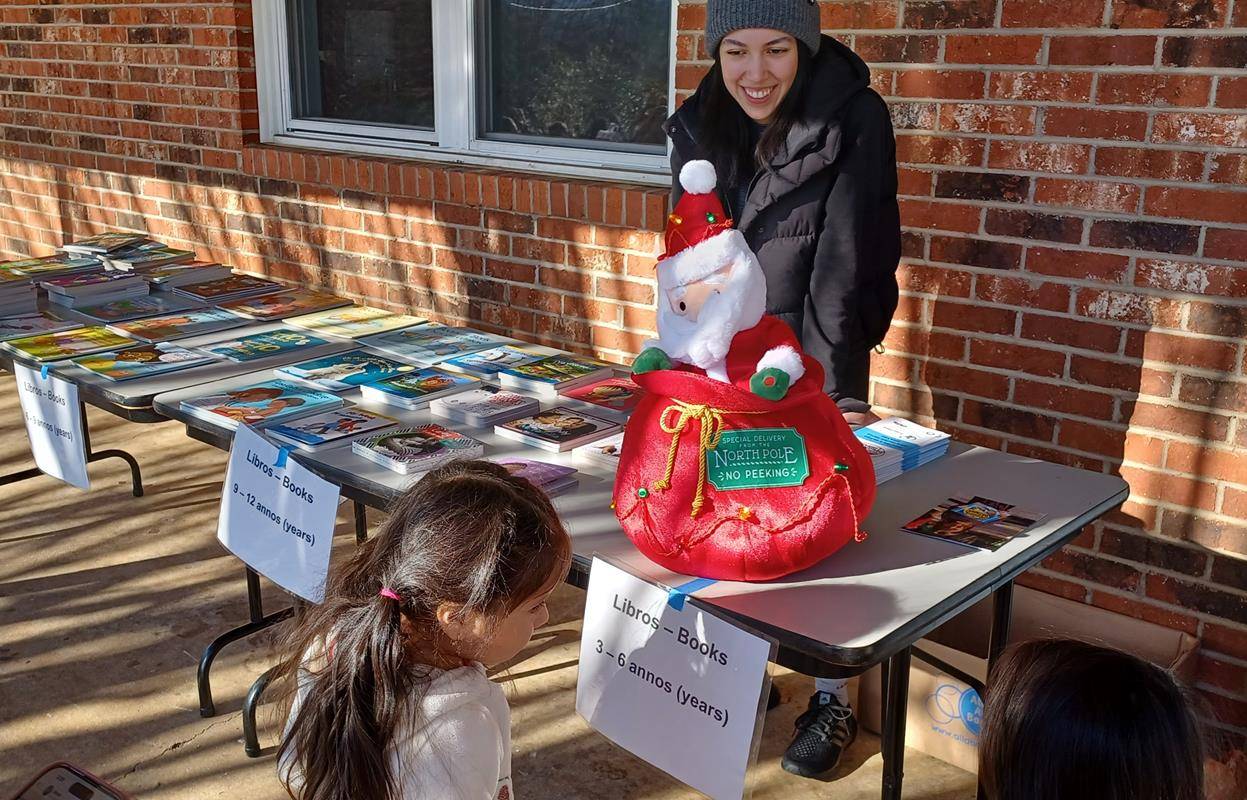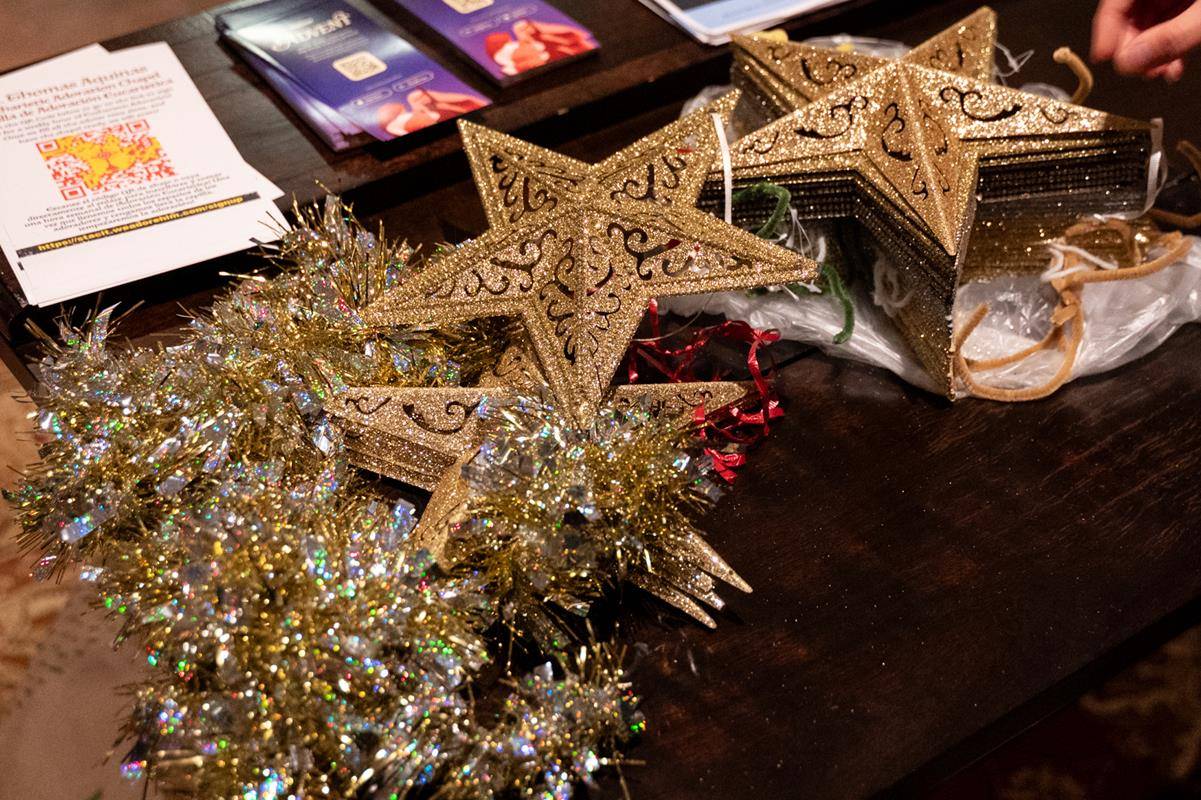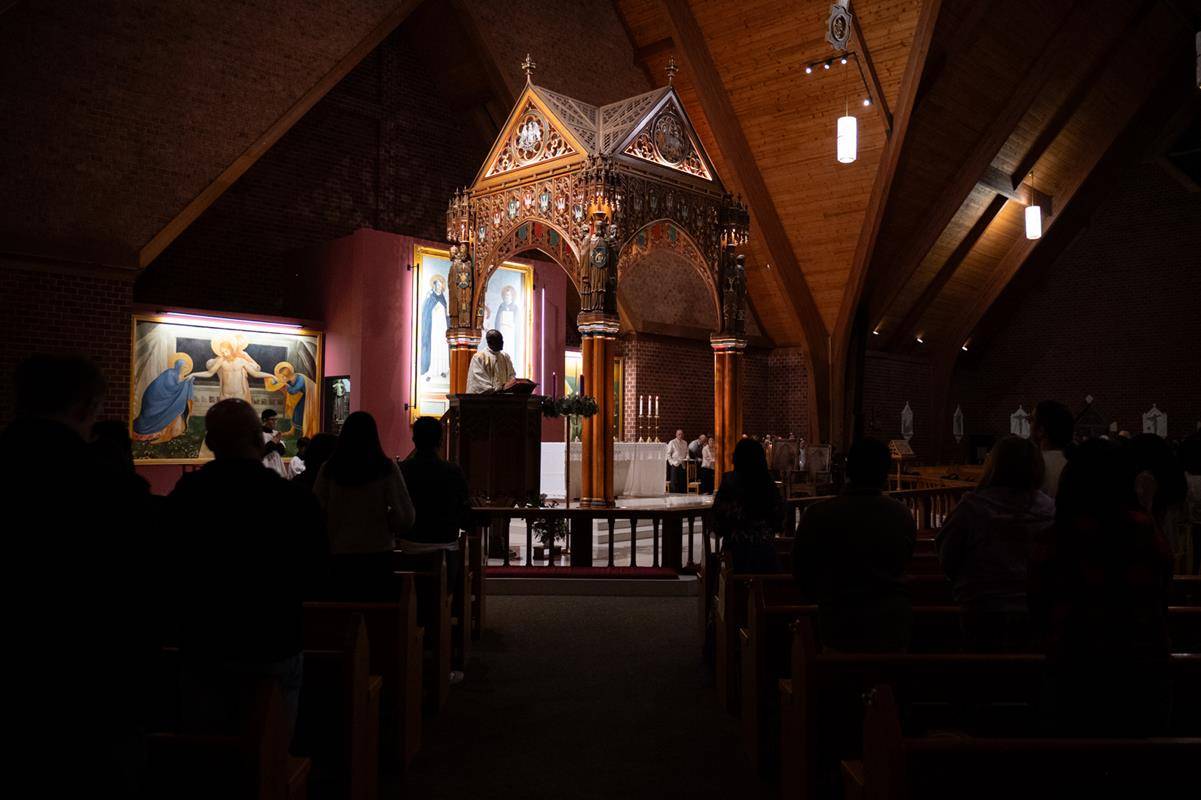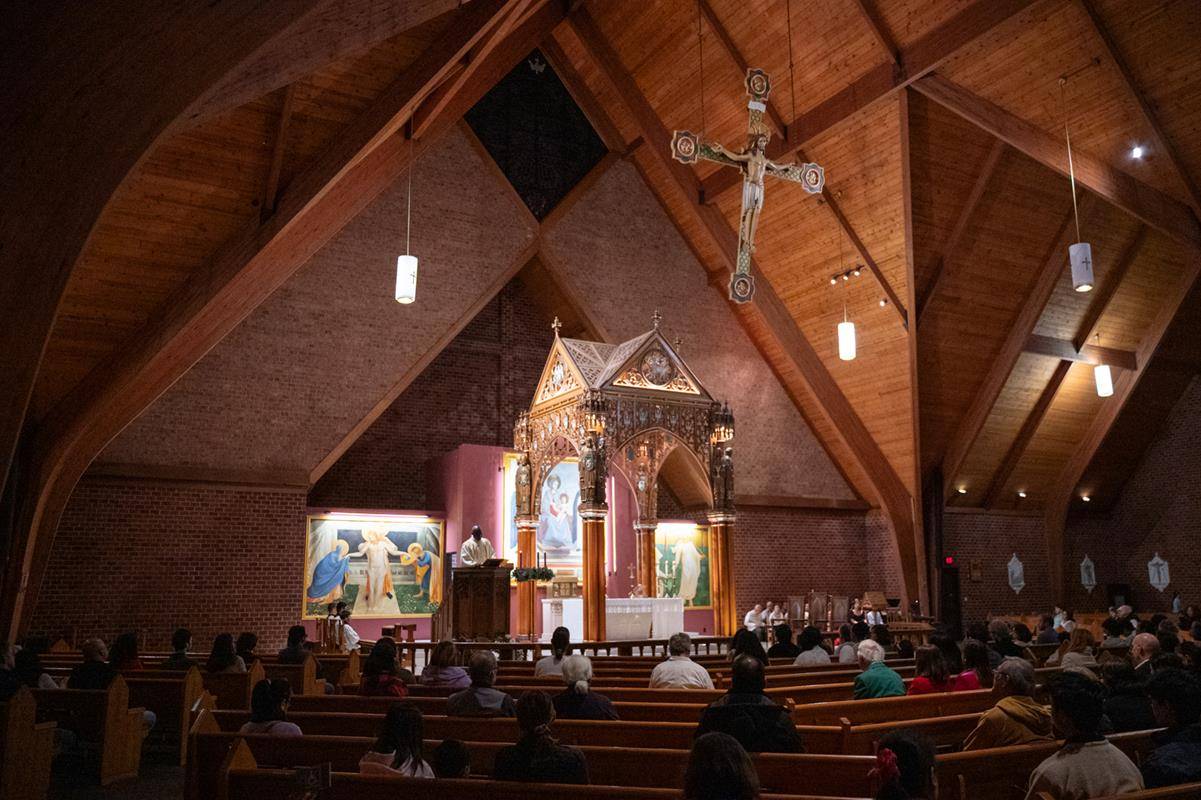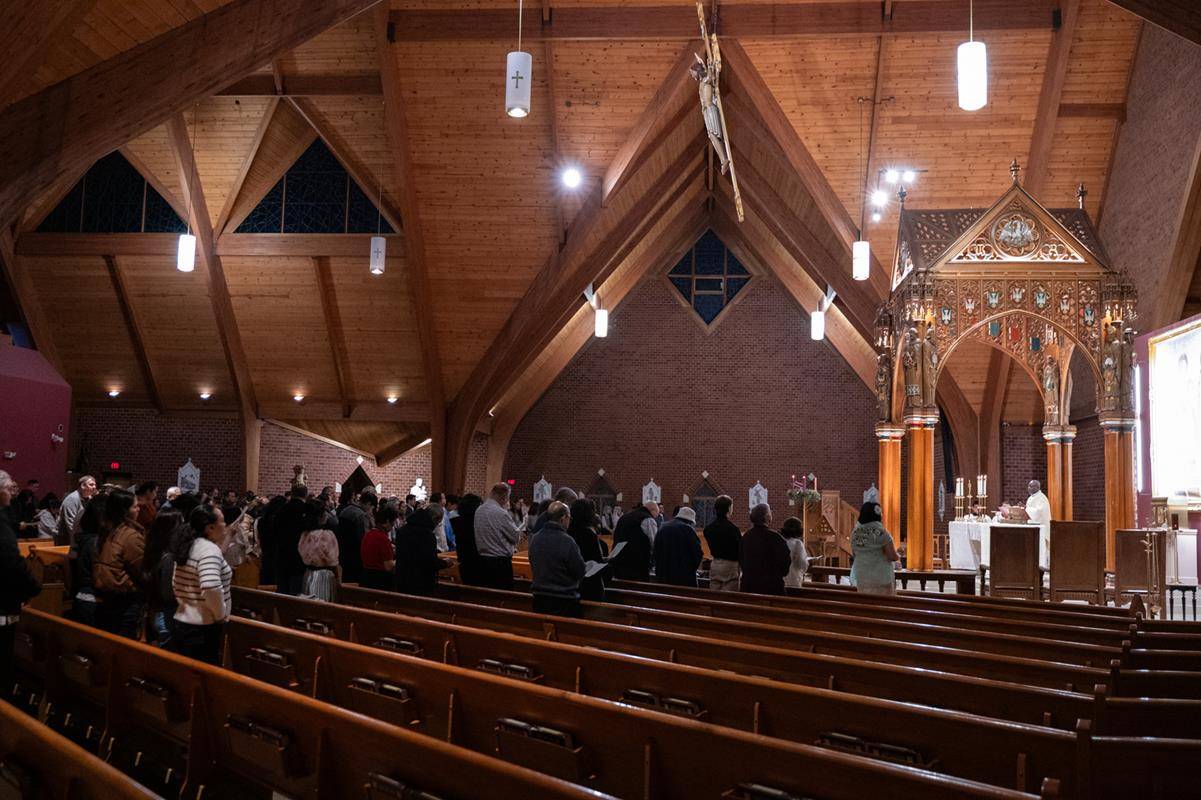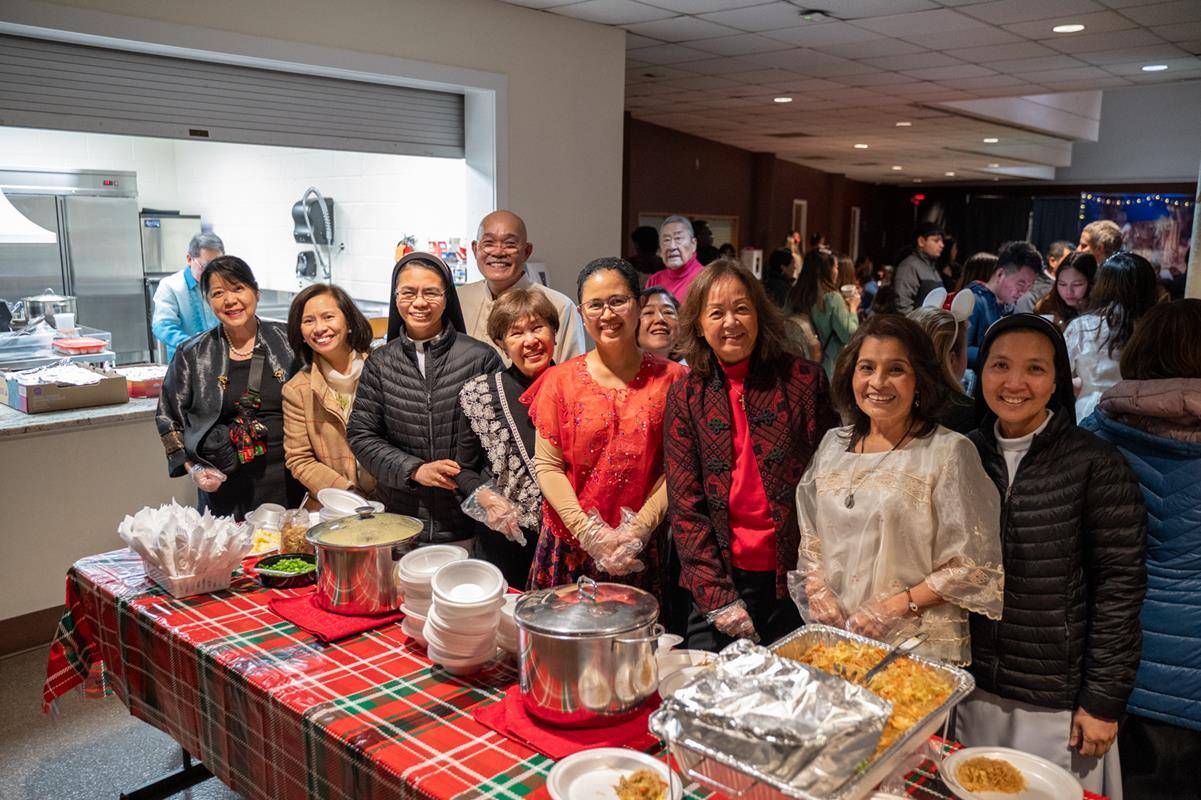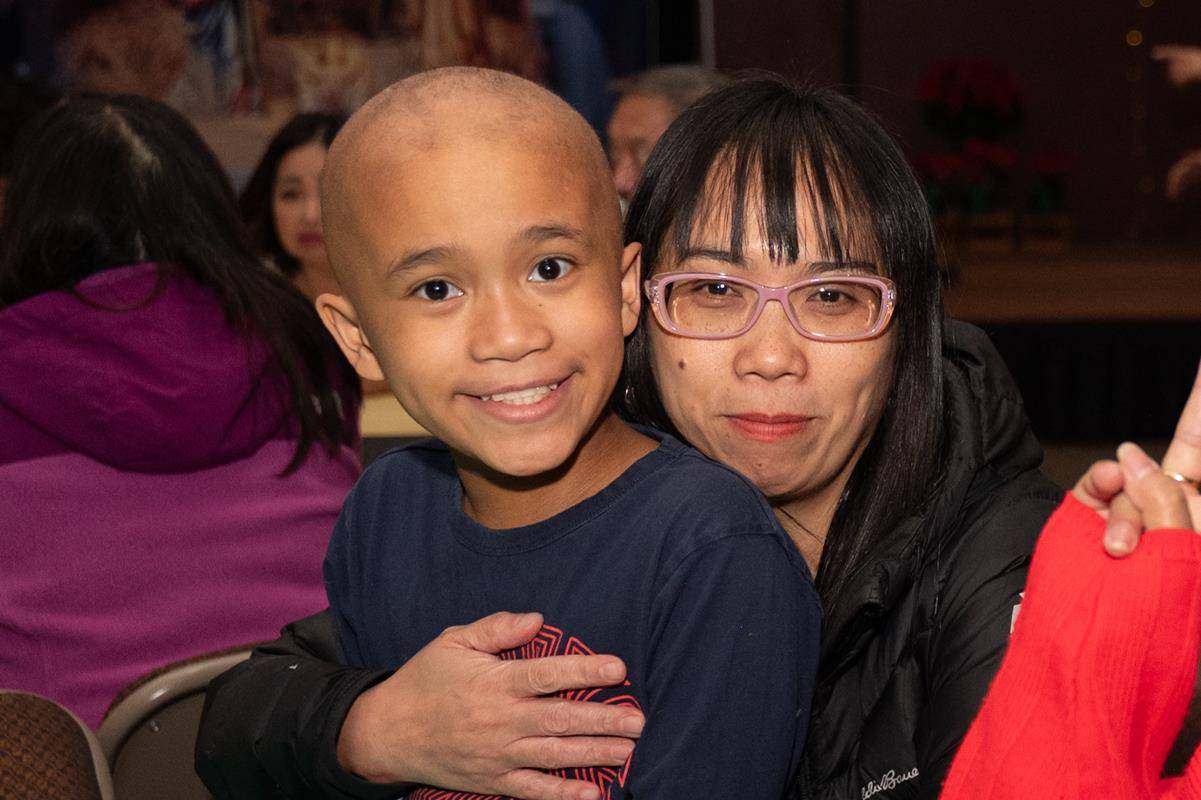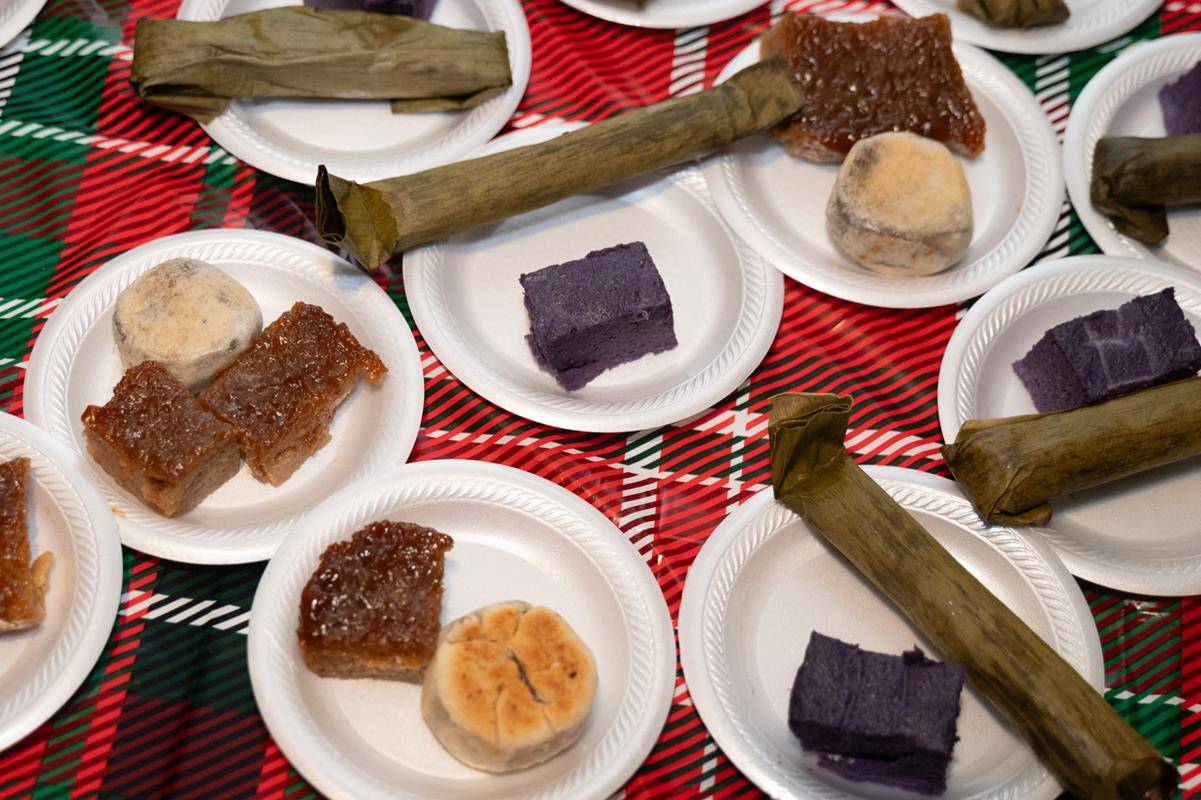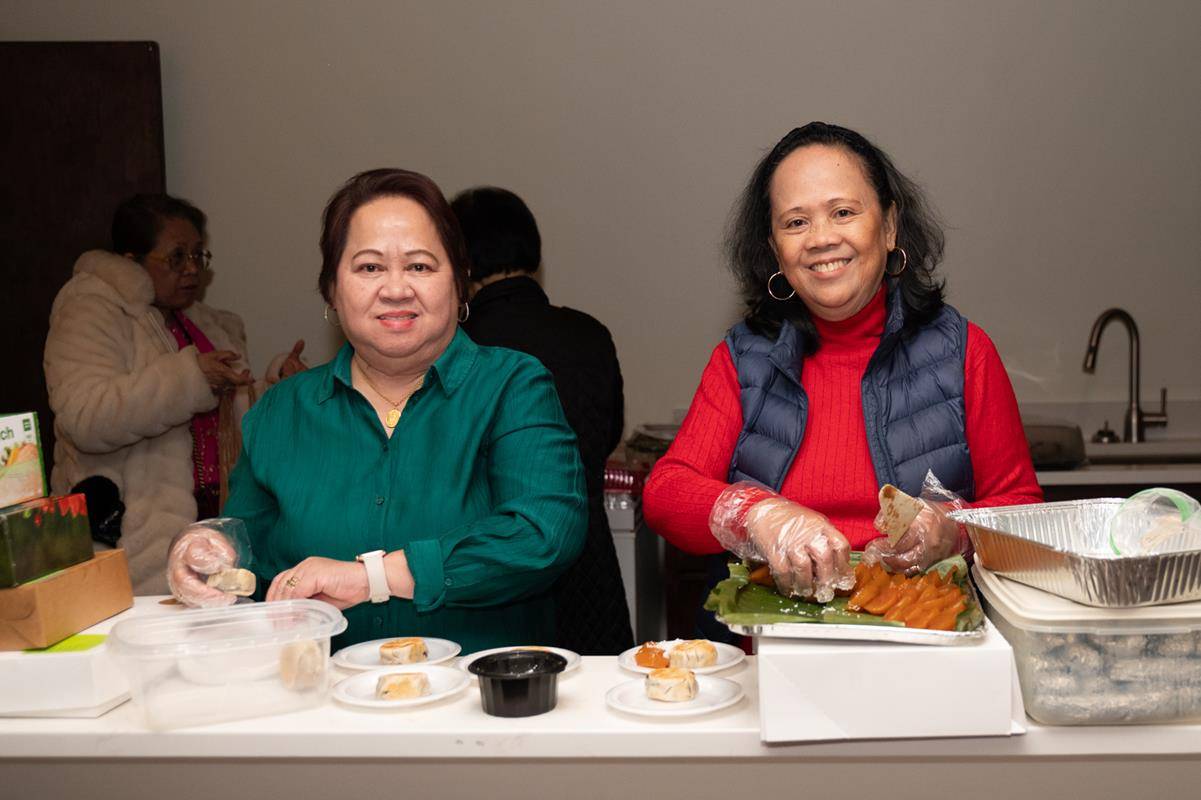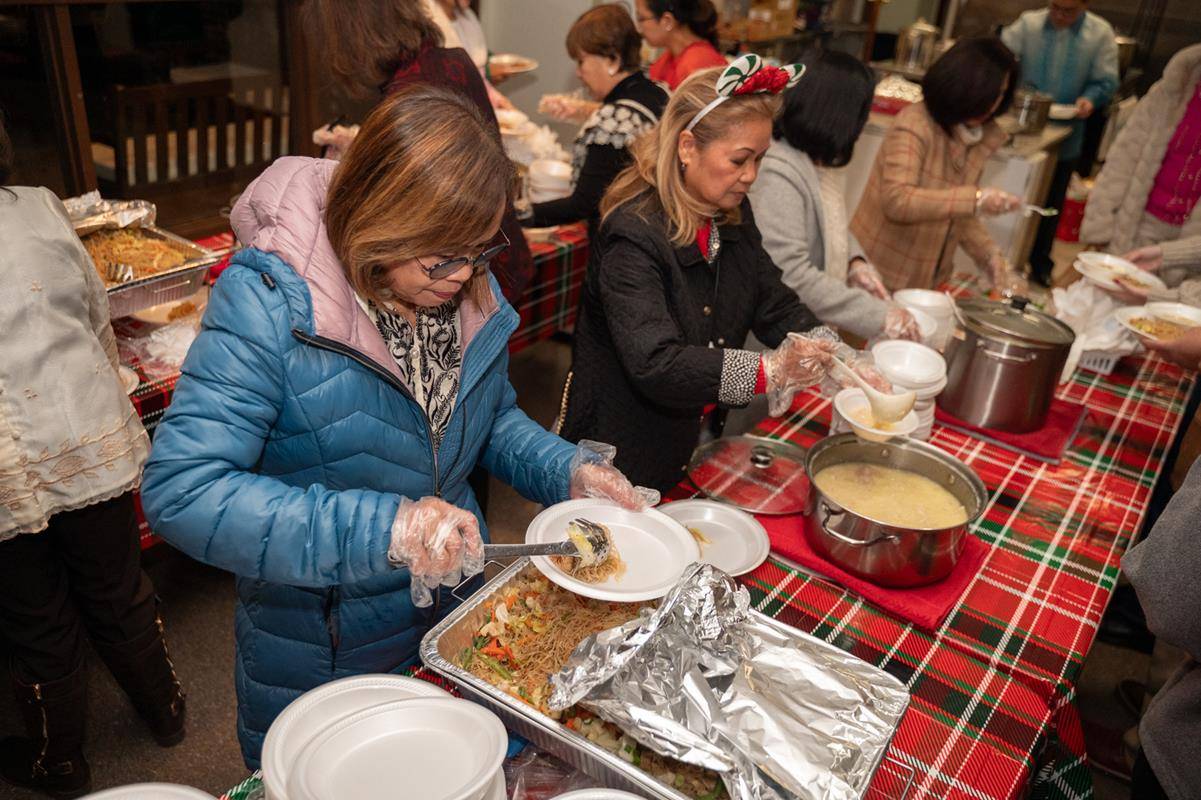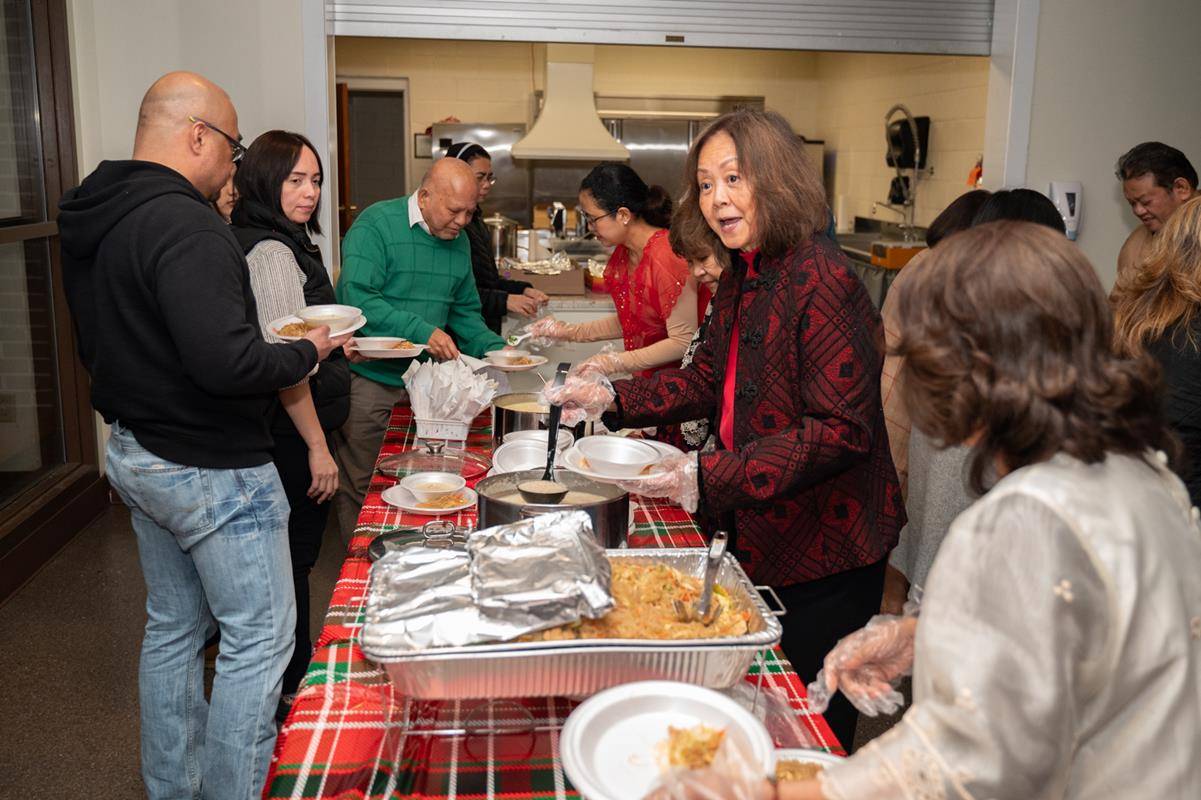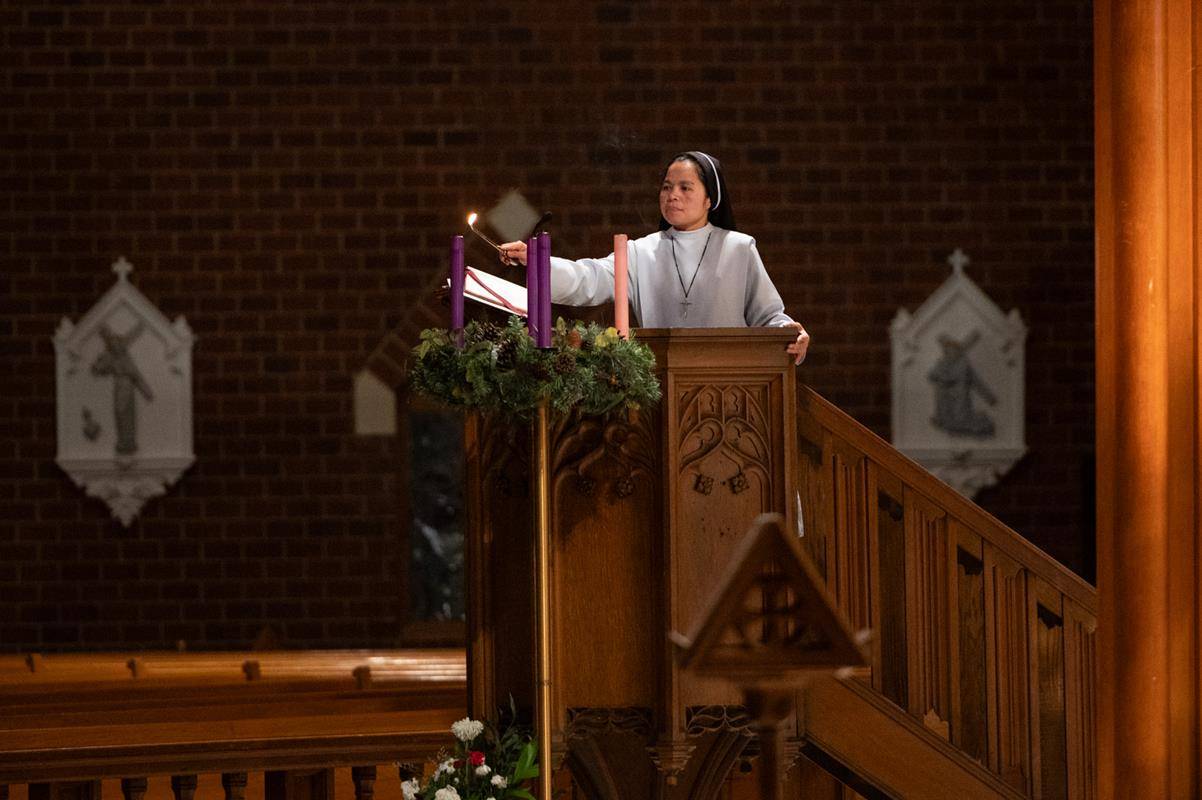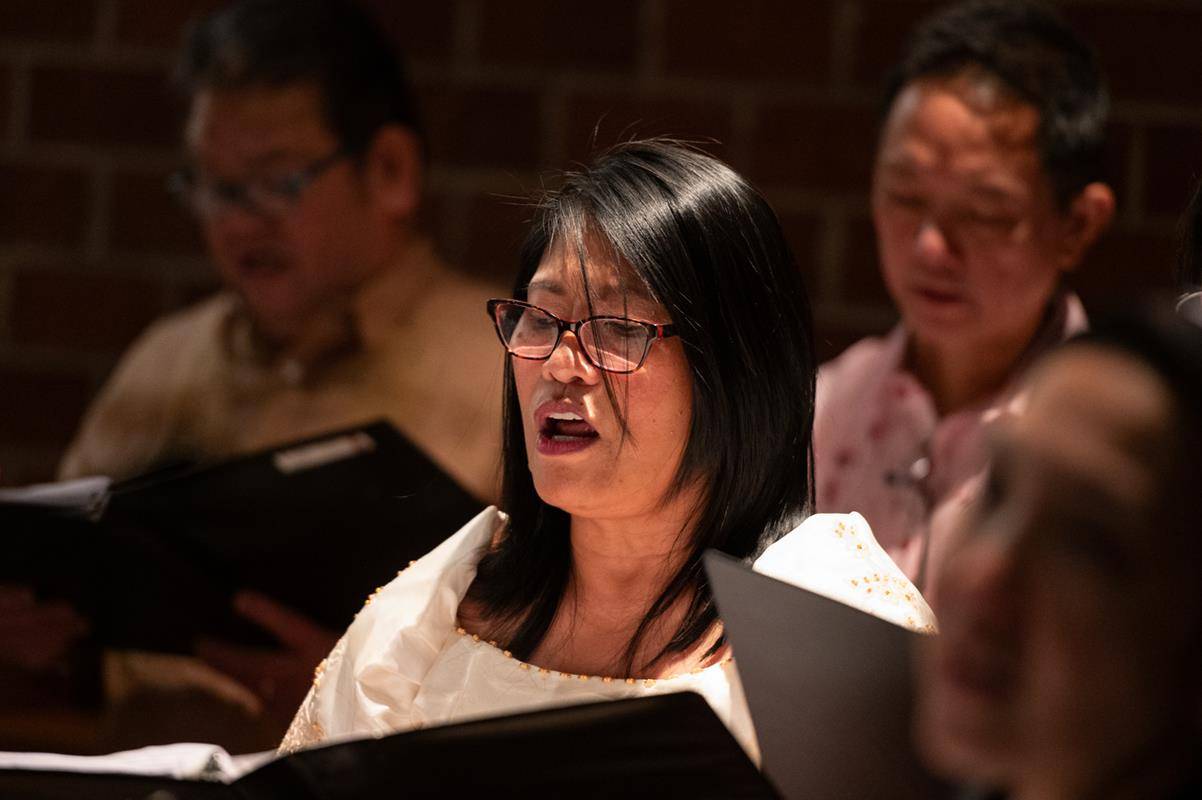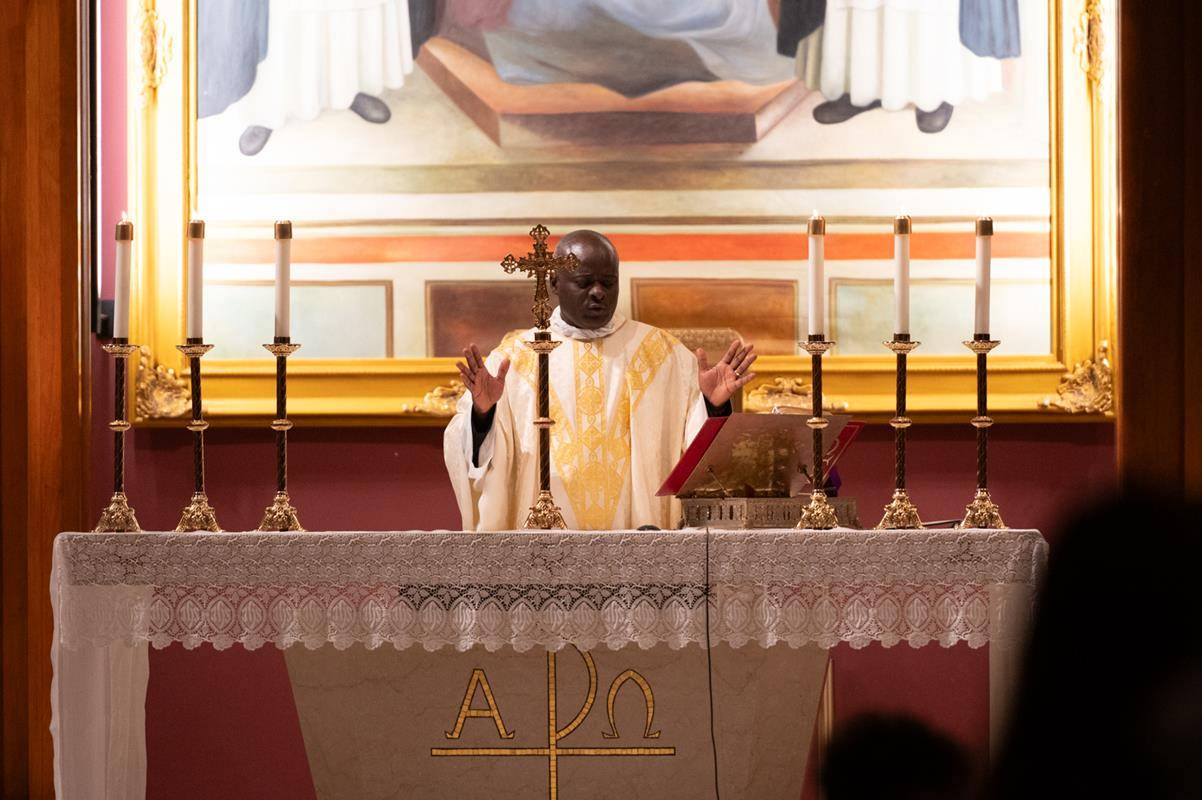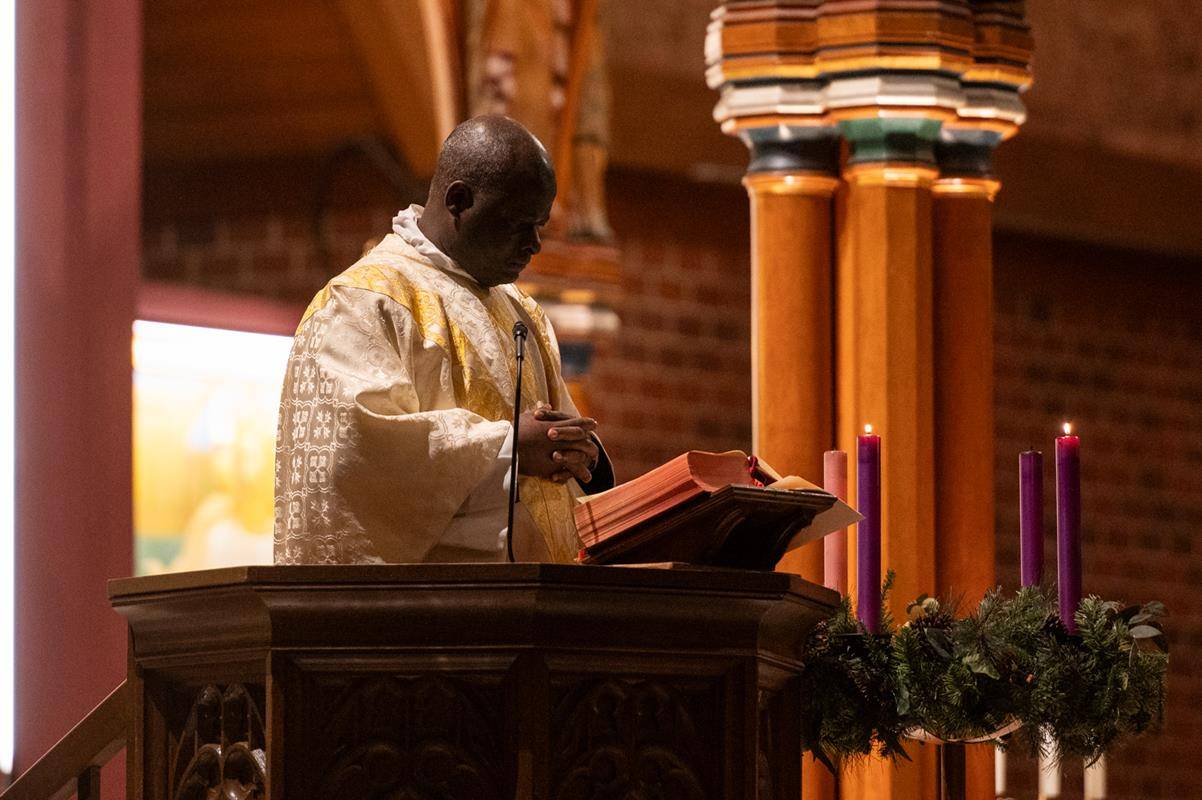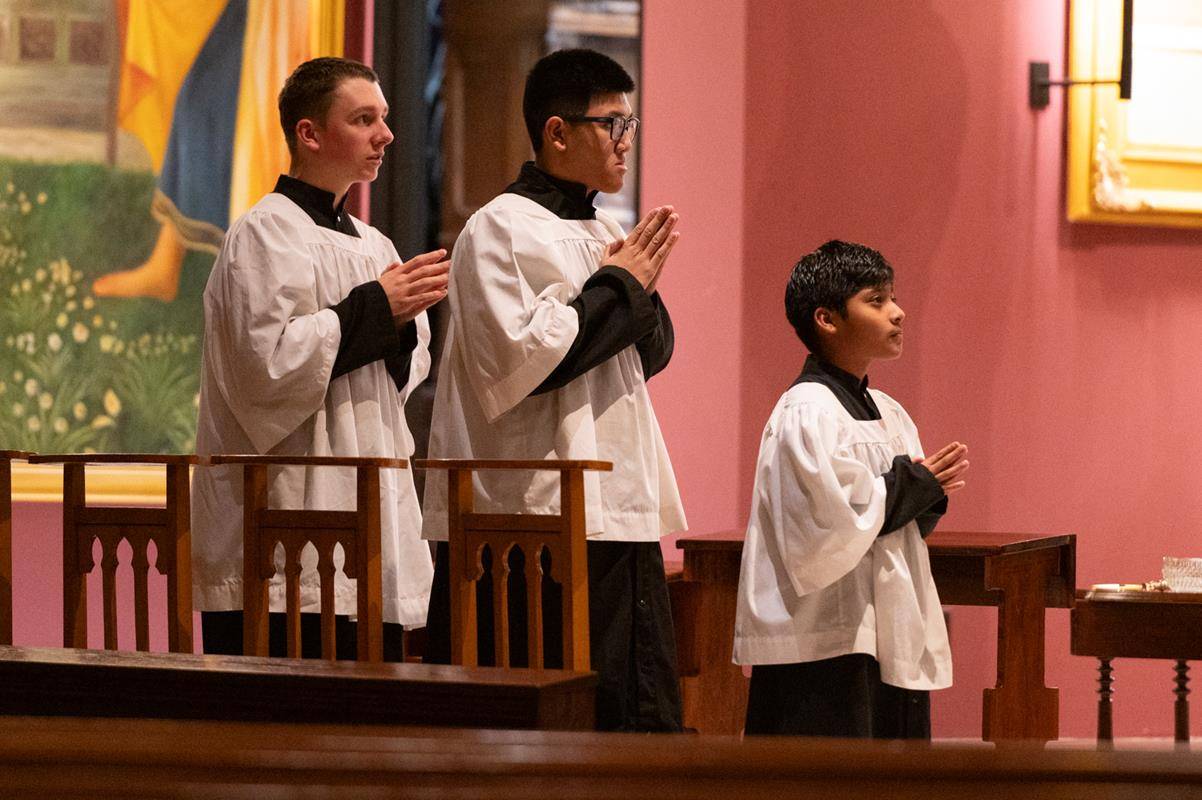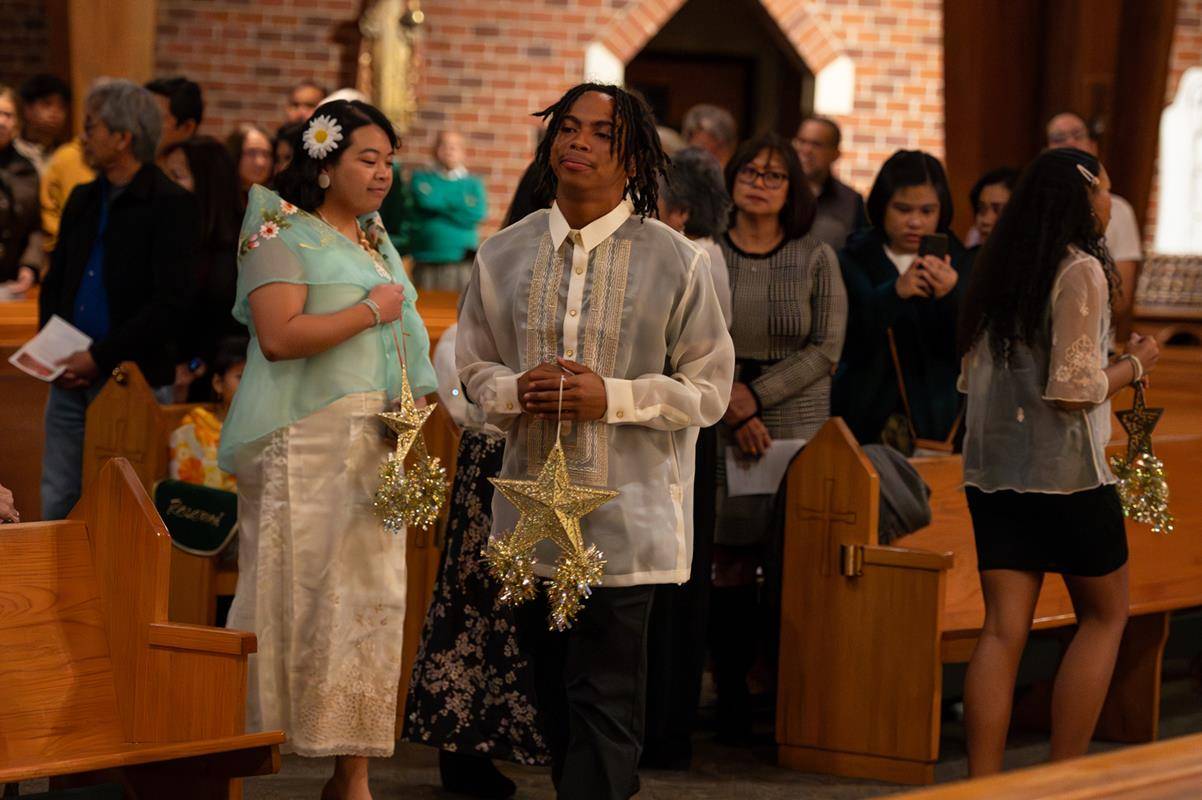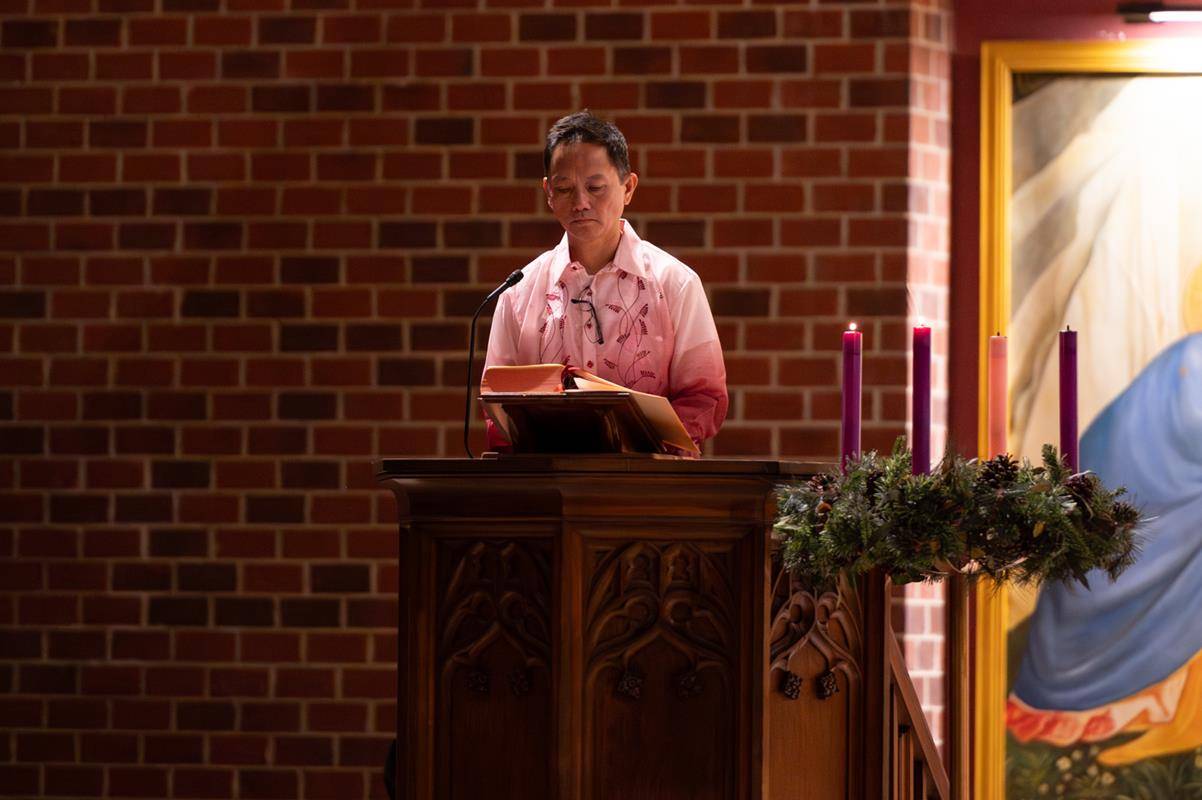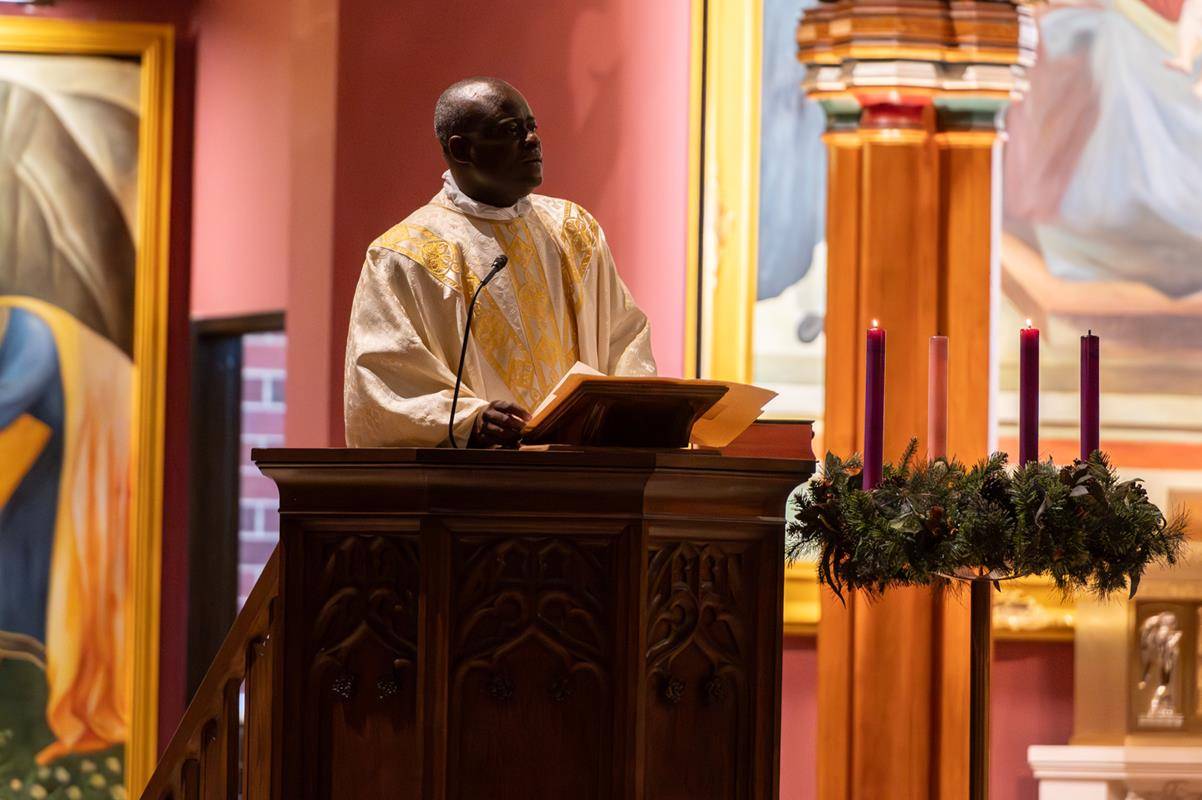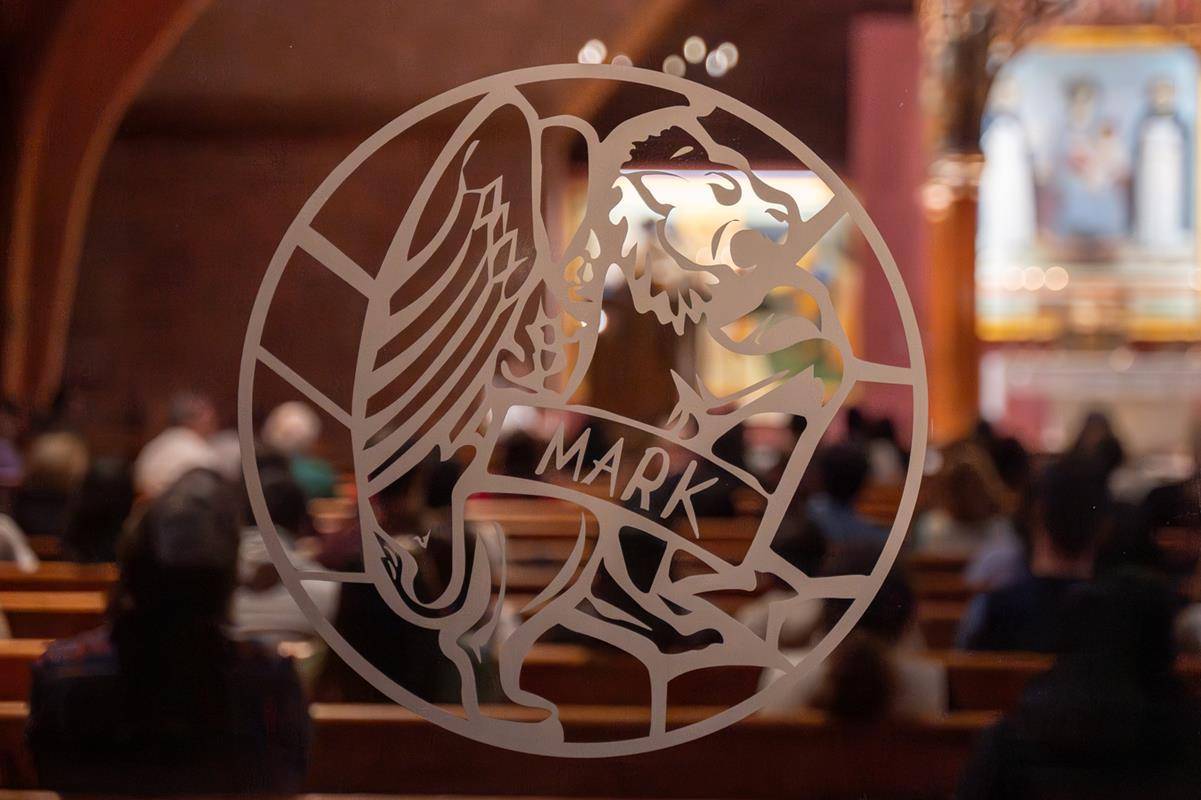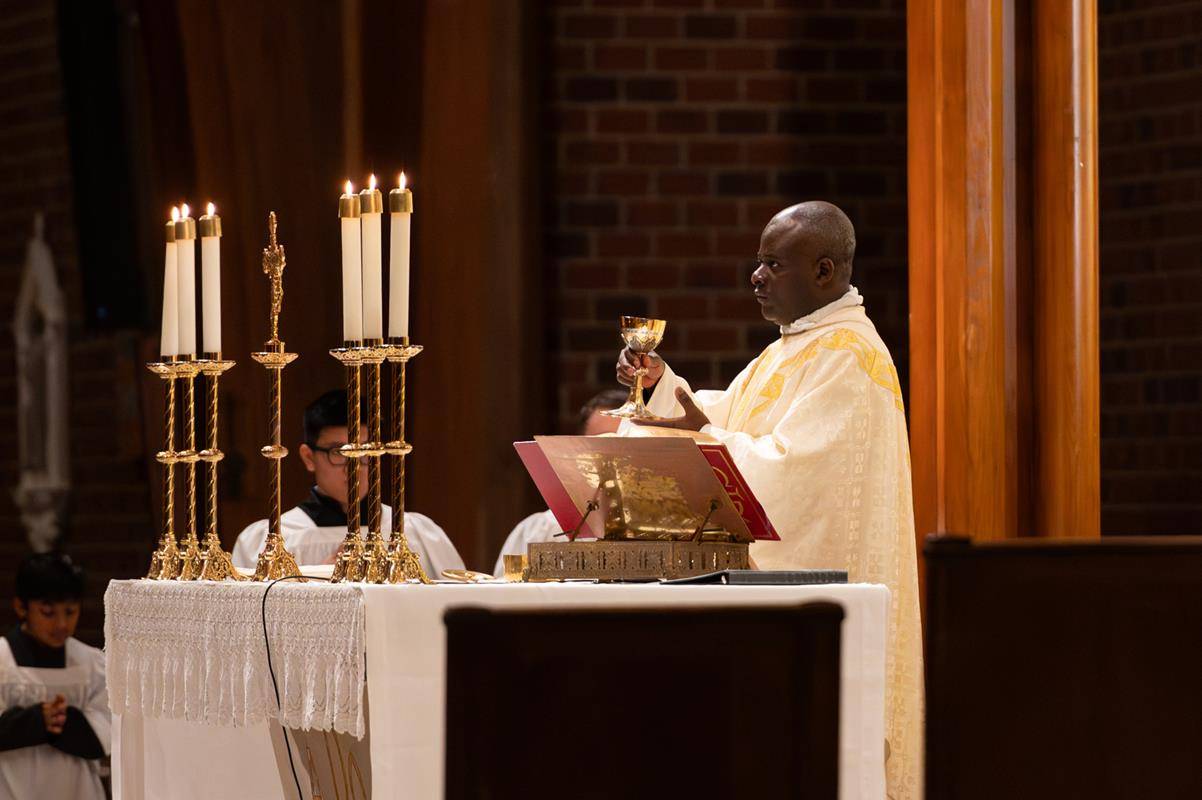Hundreds of families receive food, gifts thanks to parishes’ donations
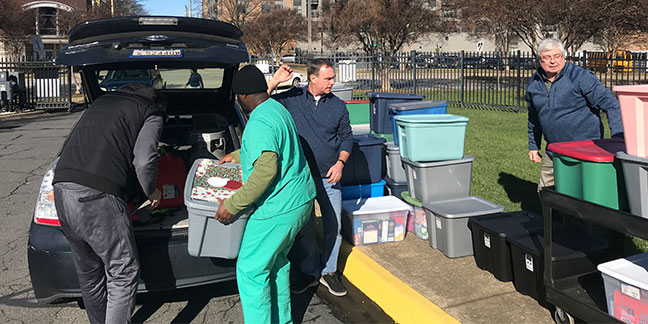 Staff and volunteers at Catholic Charities offices throughout the Diocese of Charlotte enjoyed sharing the true spirit of Christmas by distributing mountains of food and gifts to deserving families in recent weeks.
Staff and volunteers at Catholic Charities offices throughout the Diocese of Charlotte enjoyed sharing the true spirit of Christmas by distributing mountains of food and gifts to deserving families in recent weeks.
Donations poured in from parishes throughout the diocese, helping to make Christmas easier on those in need. Charlotte’s St. Matthew Parish dropped off 125 baskets of food Dec. 18 at Catholic Charities’ Charlotte office, which distributed the items the same day.
Boy Scouts from St. Luke Parish in Mint Hill also arrived at the downtown Charlotte office that morning bearing 75 boxes of food. These were distributed Dec. 19 during the Charlotte office’s regular weekly food pantry.
Catholic Charities’ Western Region Office in Asheville also stayed busy with its weekly food pantry and regular markets with its partner, MANNA FoodBank. On Dec. 12, as part of their monthly market at Woodfin Community Center, children were invited to choose books they’d like to keep.
The Western Region Office also held its annual angel tree project. Piles of gifts filled the office at 50 Orange St. in Asheville over the past month, thanks to the generosity of donors throughout western North Carolina.
Longtime angel tree volunteer and Western Region Office advisory board member Susan Loveland coordinated gifts for more than 55 families. It was “organized chaos” as
Loveland led the efforts to ensure that all 279 program participants received gifts. Volunteer and advisory board member Donna Bange helped track more than 600 angel tree requests.
At the Catholic Charities office in Winston-Salem, staff and volunteers organized and distributed holiday meals and gifts from Holy Family Parish in Clemmons and St. Leo the Great Parish in Winston-Salem. Together, the parishes donated enough food, toys and gift cards to help 108 families. Joy filled the hearts of everyone concerned as they loaded trunks with all the goods needed for a Merry Christmas.
— Annie Ferguson. Photos provided
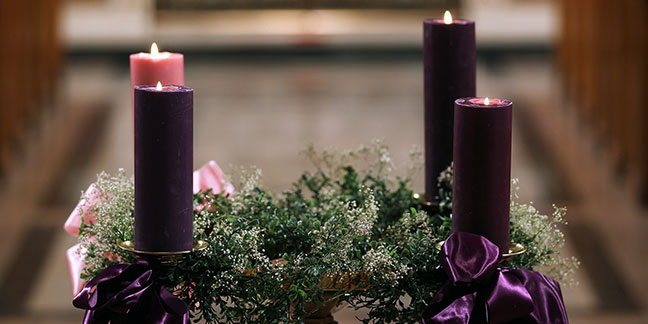 CHARLOTTE — This year the Fourth Sunday of Advent falls the day before Christmas, so Catholics should plan ahead to attend Mass to fulfill both holy days of obligation.
CHARLOTTE — This year the Fourth Sunday of Advent falls the day before Christmas, so Catholics should plan ahead to attend Mass to fulfill both holy days of obligation.
People will need to attend Mass for the Fourth Sunday of Advent, and then again for Christmas – two separate liturgies to celebrate the two distinct holy days. Catholics are not allowed to attend one Mass to “cover” both holy days.
To accommodate people’s needs, Bishop Peter Jugis is giving pastors the option of adding more Masses Dec. 23-25.
Masses for the Fourth Sunday of Advent can be offered anytime after 3 p.m. Saturday, Dec. 23. Masses for Christmas can be offered any time after 2 p.m. Sunday, Dec. 24, guidance from the diocese’s Office of Divine Worship stated.
As a result, Mass times may vary, so check your local parish’s website and bulletin to plan your Mass attendance schedule.
“Ideally, this is an opportunity to foster a love for the Sacred Liturgy and to enkindle a desire to celebrate the holy days as fully as reasonably possible,” the Divine Worship guidance to pastors noted.
 CHARLOTTE — Members of the Filipino community from around Charlotte gathered Friday night, Dec. 15, at St. Thomas Aquinas Church to celebrate Simbang Gabi, a special Mass that is part of a beloved spiritual tradition from the Philippines.
CHARLOTTE — Members of the Filipino community from around Charlotte gathered Friday night, Dec. 15, at St. Thomas Aquinas Church to celebrate Simbang Gabi, a special Mass that is part of a beloved spiritual tradition from the Philippines.
The Simbang Gabi Mass dates back to the 17th century when farmers and other laborers in the Philippines attended Masses early in the morning during the days leading up to Christmas to receive special blessings before going to work. Simbang Gabi, which means “Night Mass” in Tagalog, is also called Misa de Gallo in Spanish, or “Mass of the Rooster,” as the Masses are traditionally held at dawn.
The Masses developed into a nine-day novena of worship at dawn and became a popular way for Filipinos to prepare spiritually for Christmas. Simbang Gabi in the U.S. has been adapted to lifestyles here, so the Masses are now most often held at night.
For the past 15 years, St. Thomas Aquinas' growing Filipino community has celebrated Simbang Gabi at the Charlotte parish, where the tradition continues to thrive, according to parishioner Nennette Costes, one of the organizers of the Mass. The parish also has three Dominican sisters from the Philippines who oversee faith formation programs at the north Charlotte parish.
Friday night’s Mass drew nearly 300 people, followed by a reception featuring traditional Filipino foods.
“It’s a wonderful time of the year, with the Mass and the traditional foods, and it’s also a great chance to see everybody and connect with people in the community,” said parishioner Bert Rodriguez.
The Simbang Gabi Mass featured many elements of traditional Filipino culture, with children carrying elaborate stars called “parols” – star lanterns displayed in homes and businesses in the Philippines during Advent and the Christmas season – leading the procession at the beginning of Mass.
The Mass also featured a choir singing beautiful, lilting hymns in Tagalog.
Parishioner Joie Arrojado became the coordinator of the choir several years ago and said she enjoys gathering to sing for the celebration.
“This is a wonderful chance for people to share their talents, and this is my yearly thing I do as an offering to the Lord for all the wonderful gifts He has given me during the year,” Arrojado said.
Hannah Asibal attended the celebration with her parents, her nieces and her sister. Asibal and other women in her family, and many other women who attended, wore beautiful long dresses decorated with elaborate beadwork and embroidery. The dresses are called “Filipinianas,” and are traditionally worn for Simbang Gabi and other Filipino cultural events, as well as weddings. Several men at the Mass wore traditional suits including long embroidered formal shirts called “barongs,” also worn by groomsmen at weddings and other special occasions.
“It’s a beautiful celebration because it’s a way to immerse ourselves in Filipino culture,” Asibal said. “It’s also important for younger people because we can see how important the tradition is to our parents who brought it here from the Philippines, and it’s a way for us to carry on those traditions here.”
— Christina Lee Knauss. Photos by Troy Hull
Popular Greensboro ministry – where mothers pray for their children who have left the faith – expands to Clemmons
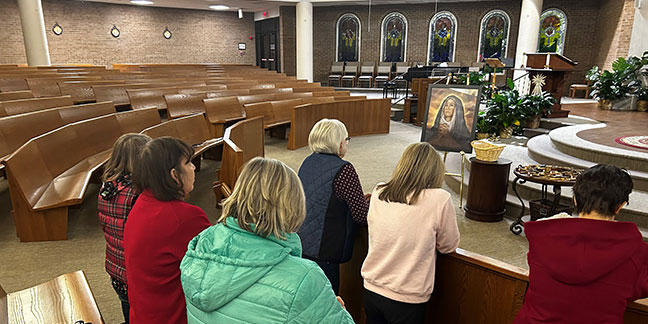 Women from across the Triad gathered Dec. 11 to pray for their children and others who have fallen away from the faith at the weekly Millions of Monicas prayer group at St. Paul the Apostle Church in Greensboro. A new chapter of the national organization is set to start Jan. 16 at Holy Family Parish in Clemmons. (Annie Ferguson | Catholic News Herald)GREENSBORO — A series of “God-incidences” led to the start of the Millions of Monicas prayer ministry in Greensboro. In the span of 24 hours, Amy Voss noticed three signs.
Women from across the Triad gathered Dec. 11 to pray for their children and others who have fallen away from the faith at the weekly Millions of Monicas prayer group at St. Paul the Apostle Church in Greensboro. A new chapter of the national organization is set to start Jan. 16 at Holy Family Parish in Clemmons. (Annie Ferguson | Catholic News Herald)GREENSBORO — A series of “God-incidences” led to the start of the Millions of Monicas prayer ministry in Greensboro. In the span of 24 hours, Amy Voss noticed three signs.
First, a woman who recently moved to the area told her, “I am feeling called to start a prayer group for my adult children.”
Voss shared this with another mom who said, “I am feeling called to start a devotion to St. Monica.”
“Then, that same night I happened to read about the national ministry called Millions of Monicas. Coincidence? I think not,” said Voss in a recent interview. “After praying about it in Adoration, the Triad chapter began.”
Fifty women showed up to the first meeting in May at St. Paul the Apostle Church in Greensboro, and about 30 consistently show up weekly to pray for their children’s return to the Catholic faith. The ministry has proven to be a balm for the souls of women from across the region.
“I felt a weight lifted off my shoulders,” said Yvette Boland, who attended one of the prayer meetings after hearing about the ministry from a friend.
As healing as it was, it can be a struggle to get to the meeting. For Boland, it’s a 40-minute drive from her Winston-Salem home to St. Paul the Apostle, so she decided to start a new chapter at Holy Family Parish in Clemmons. The first meeting at Holy Family will be held at 7 p.m. Tuesday, Jan. 16.
Boland, a mother of four, said she believes the ministry is spreading quickly throughout the country because so many have fallen away from the faith. Some of the women who attend have no children of their own, and they, along with others in the group, may also pray for neighbors, spouses, siblings and extended family.
The one-hour meetings – held at St. Paul the Apostle Mondays at 7 p.m. and Tuesdays at 9 a.m. during the winter months – include prayers composed specifically for those who have fallen away from the faith as well as Scripture, time for reflection, small-group prayer, and the rosary.
An image of St. Monica is set up in front of the altar along with a table of small crucifixes that are held during prayer in the small groups. The group’s patroness is there in spirit and imagery as well as inside the altar, where there is a relic of St. Monica, a fourth-century Catholic in Northern Africa who prayed unceasingly for her son – the future St. Augustine – to return to the faith.
The organizers say that Millions of Monicas is not a support group in that there aren’t discussions about specific situations – just prayer and the chance to reflect on positive changes they’ve noticed in those for whom they are praying. Each person in the small groups takes home the first names of three children to pray for throughout the week.
“We have to remember that St. Monica prayed for years for her husband and her mother-in-law before she ever prayed for her son, who had not yet strayed,” said Sherry Lineberry, one of the Greensboro coordinators. “St. Monica was all about the family.”
It can be quite painful for the mothers to talk about why they take part in this ministry, but several opened up to the Catholic News Herald during comments after the Dec. 11 prayer meeting.
Mary Wells has been attending since the ministry started and is praying for her youngest daughter, who has struggled a long time with Catholic faith. She noted that she also prays for her other two children who still practice.
“In our struggling world today, they need all the help they can get,” she said. “When I come here and I’m with other moms who are praying, there’s something special about it. It makes me feel uplifted.”
Another mom, Beth, added that she had been praying for a ministry like this to start. For many years, she has been concerned for her three daughters who were born cradle
Catholics and brought up in the Church and Catholic schools.
“They are all not practicing now. The same is true of so many of my friends’ children. All of us moms who were friends thought we were doing our best,” she said. “We raised them up with the best foundation, so this has been just heartbreaking to see so many of our young generation not practicing the Catholic faith.”
The Millions of Monicas group has proven to be a bright spot in the darkness. Beth has noticed that her middle daughter is showing signs of returning because she wants to get her baby baptized.
“With this ministry there’s a little something extra that we can do now to fight Satan and what he’s sadly doing to our young generation,” she added with conviction. “We need to pray and pray and then pray some more.”
St. Monica couldn’t have said it better herself.
— Annie Ferguson


